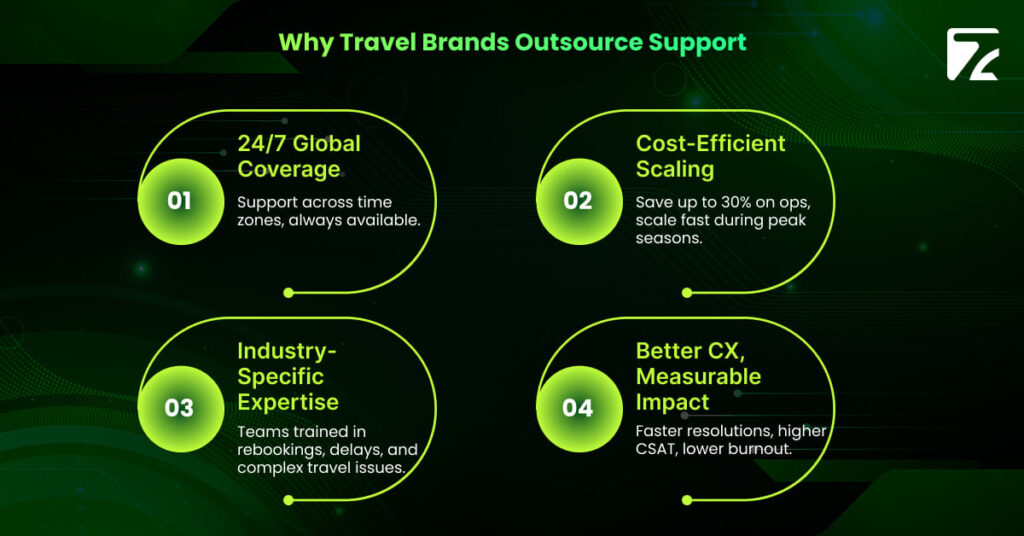You’re at the airport. It’s late. Your flight just got canceled, and now you’re standing in a long line with no idea what’s going on. You try calling the airline no answer. You tweet at them. Still nothing.
Frustrating, right?
That’s the kind of moment where customer support makes or breaks the experience.
For travel companies, offering great support isn’t just nice it’s necessary. But let’s be honest: doing it all in-house? It’s hard. Expensive. Exhausting.
That’s why more travel brands are outsourcing their support. And it’s not about cutting costs (although it helps). It’s about delivering better service, all day, every day, without burning out your team.
It’s pretty simple. You partner with an external team usually specialists who handle your customer service. They answer calls, respond to emails, jump into chats, and reply to messages on social media.
They work as your support team just not inside your office.

Travel doesn’t follow a 9-to-5 schedule. Customers are booking trips, missing flights, changing hotels… at all hours.
After the pandemic, the industry had to get lean and flexible. That’s when many travel brands realized: outsourcing gave them the ability to stay available 24/7, across languages and time zones, without the headache of managing it all internally.
According to Statista, the outsourcing market is heading toward $114 billion by 2025. Travel’s a big part of that.
People travel across time zones. They need help in the middle of the night, during layovers, or while stranded abroad.
Outsourced teams offer round-the-clock, multilingual help so no one’s left hanging.
Hiring and training an in-house team costs a lot. Outsourcing cuts those expenses by up to 30% (Deloitte says so), and you still get trained professionals.
Good outsourcing partners specialize in the industry. That means they know how to handle rebookings, delays, last-minute changes you don’t have to teach them.
Got a holiday rush coming? Outsourced support teams can grow with you fast. No panic hiring, no overtime stress.
While the external team handles support tickets, refunds, or itinerary fixes, your internal folks can work on big-picture stuff like launching new packages or building partnerships.
| Channel | Best For |
|---|---|
| Phone | Urgent changes, last-minute cancellations |
| Confirmations, detailed requests | |
| Live Chat | Quick questions while browsing |
| Social Media | Complaints, public feedback |
| Chatbots | Basic FAQs, 24/7 instant replies |
One mid-sized online travel agency had a problem too many tickets, not enough agents. Their team was exhausted. Customers were waiting too long.
So, they outsourced.
They didn’t just fix their support they improved their entire customer experience.
Yes if you choose the right partner. Look for firms that use end-to-end encryption, follow GDPR, and have clear security protocols.
They can if you train them right. Share style guides, tone examples, and do regular QA. Most good providers want to match your brand voice.
That’s actually a benefit. While your internal team sleeps, the outsourced team handles night shifts. You get 24/7 coverage without running your own graveyard shift.
| Training Area | Why It Matters |
|---|---|
| Destinations & Tours | Helps answer common booking and trip questions |
| Emergency Handling | Deals with flight delays, lost bookings, etc. |
| CRM Tools | Navigates your support and ticketing platforms |
| Cultural Sensitivity | Prevents miscommunication with global customers |
Keep an eye on a few key metrics:
These numbers tell you if your outsourced team is actually delivering.
Chatbots are learning fast. They’re now handling complex queries and freeing up human agents for bigger issues.
Think voice assistants that can rebook your flight or find your hotel all by talking to them.
Customers don’t care what platform they’re using. They might start on Facebook and finish on live chat. Your support needs to keep up.
Support based on past trips, loyalty tiers, preferences it’s no longer a bonus. Travelers expect it.
One word can make or break a conversation. Agents trained to understand different customs = better support for global travelers.
Don’t wait for customers to chase you. Let them know about flight delays, gate changes, or cancellations before they ask.
Your support process should fit your brand not force you into a template. Good partners will customize it with you.
Ask for regular reports, scorecards, and QA reviews. Transparency builds trust and helps you improve.
Outsourcing customer support isn’t about losing control. It’s about gaining consistency, coverage, and peace of mind without stretching your internal team thin.
Done right, it makes travelers feel taken care of. And when travelers feel supported, they come back.
If you’re growing, scaling, or just overwhelmed yes. It’s worth exploring.
Absolutely. With the right onboarding and SLAs, many brands improve their support.
Choose a partner who follows GDPR, encrypts everything, and has tight access controls.
Most companies see 20–30% cost savings, plus faster service and higher CSAT.

Travel Automation Expert